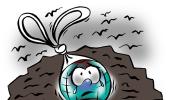In just the latest reminder of the dangers of pollution in our oceans, a dead whale in Indonesia has been found with more than 1,000 pieces of plastic waste in its stomach, including drinking cups and flip-flops.

Rescuers at the Wakatobi National Park found the rotting carcass of the 9.5-metre-long sperm whale on Monday night near the park in Southeast Sulawesi province in Indonesia.
Researchers from wildlife conservation group World Wildlife Fund and the park’s conservation academy found about 5.9 kg of plastic waste in the animal’s stomach.
Among the debris was 115 plastic cups, four plastic bottles, 25 plastic bags, two flip-flops, a nylon sack and more than 1,000 other pieces of plastic, park chief Heri Santoso said.

“Although we have not been able to deduce the cause of death, the facts that we see are truly awful,” Dwi Suprapti, a marine species conservation co-ordinator at WWF Indonesia, was quoted as saying.
She said it was not possible to determine if the plastic had caused the whale’s death because of the animal’s advanced state of decay.

A 2015 report by Ocean Conservancy and the McKinsey Center for Business and Environment found that over 50 per cent of the plastic leaking into world oceans comes from China, Indonesia, the Philippines, Thailand and Vietnam.
The report claims that a 65 per cent reduction in plastic waste leakage in those five countries would lead to a 45 per cent reduction globally.
Without intervention, the amount of plastic cluttering the Earth’s oceans will triple within a decade, according to a recent study by the United Kingdom government.












 © 2025
© 2025